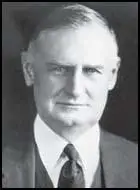Robert E. Wood

Robert Wood was born in Kansas City in 1879. After graduating from West Point he served in the United States Army. During the First World War he was the army's quartermaster general.
In 1924 Wood became vice-president of Sears, Roebuck & Company. He was appointed president four years later. While in charge of the company he helped it become the world's largest general merchandiser. Wood also established the largest employee savings and profit-sharing pension plan in the country.
Wood, a member of the Republican Party, helped establish the America First Committee (AFC) in September 1940. The America First National Committee included Wood, John T. Flynn and Charles A. Lindbergh. Supporters of the organization included Burton K. Wheeler, Hugh Johnson, Robert LaFollette Jr., Hamilton Fish and Gerald Nye.
The AFC soon became the most powerful isolationist group in the United States. The AFC had four main principles: (1) The United States must build an impregnable defense for America; (2) No foreign power, nor group of powers, can successfully attack a prepared America; (3) American democracy can be preserved only by keeping out of the European War; (4) "Aid short of war" weakens national defense at home and threatens to involve America in war abroad.
Supporters of the America First Committee in the Senate attempted to defeat the administration Lend Lease proposal. Gerald Nye, Burton K. Wheeler, Hugh Johnson, Robert LaFollette Jr., Henrik Shipstead, Homer T. Bone, James B. Clark, William Langer, and Arthur Capper, all voted against the measure but it was passed by 60 votes to 31.
In a speech in Des Moines, Iowa, Charles A. Lindbergh claimed that the "three most important groups who have been pressing this country toward war are the British, the Jewish and the Roosevelt administration". Soon afterwards Gerald Nye argued "that the Jewish people are a large factor in our movement toward war." These speeches resulted in some people claiming that the America First Committee was anti-Semitic.
The America First Committee influenced public opinion through publications and speeches and within a year had 450 local chapters and over 800,000 members. The AFC was dissolved four days after the Japanese Air Force attacked Pearl Harbor on 7th December, 1941.
In 1954 Wood established the right-wing Manion Forum. The following year he joined forces with Robert R. McCormick, the owner of the Chicago Tribune, to establish American Security Council (ASC). Wood and McCormick started the ASC because they believed that the United States had lost the Korean War because of communist infiltrators. Early members included Douglas MacArthur, Sam Rayburn, Ray S. Cline, Thomas J. Dodd, W. Averell Harriman, Nelson A. Rockefeller, Eugene V. Rostow, John G. Tower, John K. Singlaub, Lawrence P. McDonald and Patrick J. Frawley.
The ASC was behind the establishment of the Mid-America Research Library (MARL). The objective of this organization was to compile files on suspected communists who might apply for jobs in the private sector. This blacklist, that included 6 million names, was provided to 3,500 companies. ASC/MARL worked very closely with the FBI and the House UnAmerican Activities Committee.
The ASC target those individuals who advocate disarmament and lower defence spending as it believes these people are victims of left-wing disinformation or are in the pay of communist states. In the 1950s the Soviet Union posed the main threat to capitalism. Therefore ASC members argued that it was important for the United States to achieve military superiority so that the Soviet Union would not dare launch a military attack.
The American Security Council was extremely powerful during the McCarthyism period in the United States. However, in the 1960s there was a decline in interest in the ASC as ideas about detente and disarmament became popular.
Robert Wood died in 1969.
